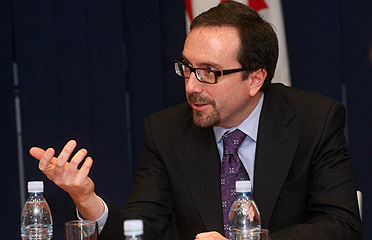
Georgia will become a NATO member by convincing Allies that it is a significant “net contributor” to the common security in the North-Atlantic region, John Bass, the U.S. ambassador to Georgia, said on March 24.
Speaking at the NATO Parliamentary Assembly’s Rose-Roth Seminar in Tbilisi, the U.S. diplomat said that since the 2008 NATO Bucharest summit there was no longer a question if Georgia would become a member of the Alliance or not; he said it’s a question of “when" and most importantly "how”.
He said these two questions of ‘when’ and ‘how’ were closely connected and the latter one was not about the technical process – whether Georgia would join NATO through Membership Action Plan or through some other technical mechanisms.
“How Georgia will become a NATO member? Well, it will become a member by convincing all of our respective governments [of NATO member states], that it is a net contributor to our respective national interests and our security in the Euro-Atlantic region,” he said.
He said that Georgia’s net contribution should be fairly substantial over liabilities the Allies would be taking when they decide to accept Georgia.
‘Fairly High Bar’
He said two aspects were important while evaluating Georgia’s net contribution to the North Atlantic security; the one was Georgia’s contribution to NATO missions and operations and another one – how Georgia would be contributing to the security within the NATO’s boundaries.
“On the first of these [aspects], there is no question Georgia is making outstanding contributions” in Afghanistan, Bass said. “I think that for the country of this size that’s a pretty remarkable contribution.”
On the second aspect, the U.S. ambassador continued, “we’ve seen quite a good progress” with Georgia coming up with “aggressive, comprehensive set of reform proposal under Georgia’s Annual National Program.”
Annual National Programme, introduced in December 2008, is set of reform targets, which is drawn by the Georgian government and reviewed annually by NATO. The recent plan, which is a classified document, was approved by the Georgian government and presented to the Alliance in February.
The U.S. ambassador said that setting ambitious reform goals was “good”, because “Georgia has to meet fairly high bar in this regard” to convince the Allies that it’s a right candidate for the membership.
“Both because of history and geography there are questions in the minds of some of the governments [of NATO member states] about what set of liabilities the allies would be taking on in accepting Georgia’s membership,” he said.
“And I think the best way that Georgia can demonstrate its readiness, its suitability to be a full member of the alliance… is by continuing to aggressively pursue the democratic reform agenda that it has undertaken and to continue to pursue free market reforms and economic development… that will further cement Georgia as a model for the countries in this region.”
Public Scrutiny of ‘How and When to Use Force’
He said there were several important aspects within this broad set of reforms on which the U.S. and many other Allies would be focusing while evaluating Georgia’s readiness to join NATO; the process of how decisions are made on potential use of force would be one of the key issues in this regard, the U.S. diplomat said.
“I think, primarily they revolve around the question of how and when a member government chooses to use force; the process to which it evaluates threats; the process to which its military forces are under civilian control; the extent to which decisions about potential use of force are subjected to rigorous analysis within government and subjected to the process of consultations with the elected representatives of people in the parliament and the extent to which those questions are subject to public debate so that any potential use of force or discussion of use of force does not come as a surprise, but is the last resort consequence of the discussions… across society just as it is for all of us in our respective [NATO-member] countries,” Bass said.
He also said that the U.S. assistance in form of democracy and governance programs to Georgia were designed to complement Georgia’s commitments under its Annual National Programme with NATO, including through strengthening civil society; creating more competitive media environment and creating more competitive environment for the political parties to contest in the 2012 parliamentary election.
“Even as we expect quite a bit from Georgia, Georgia has reason to expect a bit from us in return,” Bass said. “We have the obligation to support the people of this country and this government as they undertake a challenging set of reforms in what remains a very tough neighborhood.”
Such a support, he said, would give “political space” to the government, opposition and the society “to move forward with confidence.”
